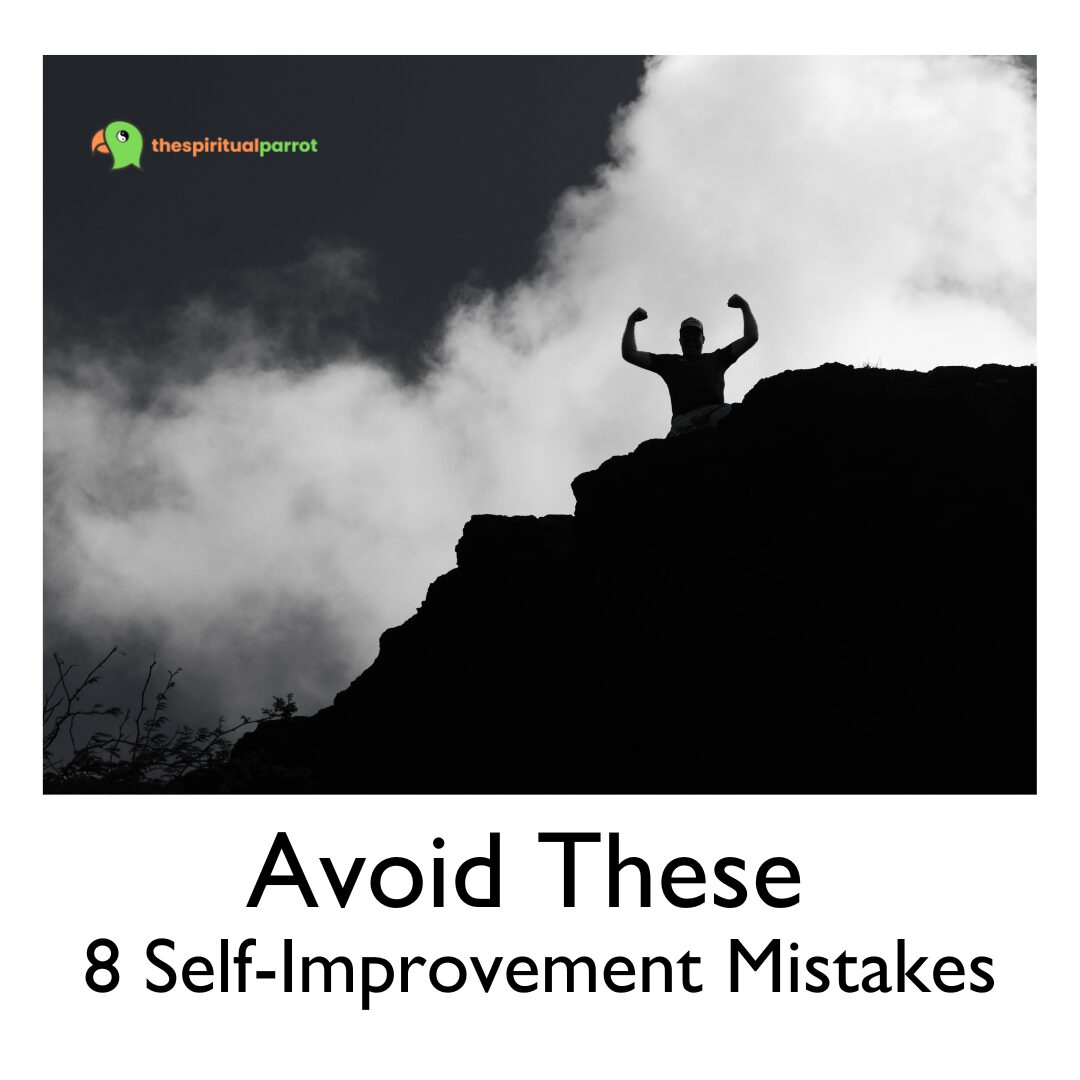Self-improvement is a journey many of us embark on, whether it’s to develop new habits, sharpen skills, or simply become better versions of ourselves. It’s a rewarding pursuit, but it’s not without its challenges. In our drive to grow, we can unknowingly stumble into common pitfalls that slow us down or even derail our progress. While it’s normal to make mistakes along the way, recognizing and addressing them can keep us on the right path.
In this post, we’ll explore some of the most frequent missteps people make in their self-improvement efforts. By understanding these mistakes, you can sidestep them and make your personal growth journey smoother and more fulfilling.
Mistake #1: Setting Unrealistic Goals
Setting goals is an integral part of any self-improvement journey. Goals give us direction and a sense of purpose, allowing us to measure progress and stay motivated. However, many people fall into the trap of setting goals that are too ambitious or vague. While it’s great to aim high, unrealistic goals often lead to frustration, burnout, and ultimately, giving up on the very things we’re trying to improve. Understanding the importance of setting the right kind of goals is crucial to making meaningful progress.
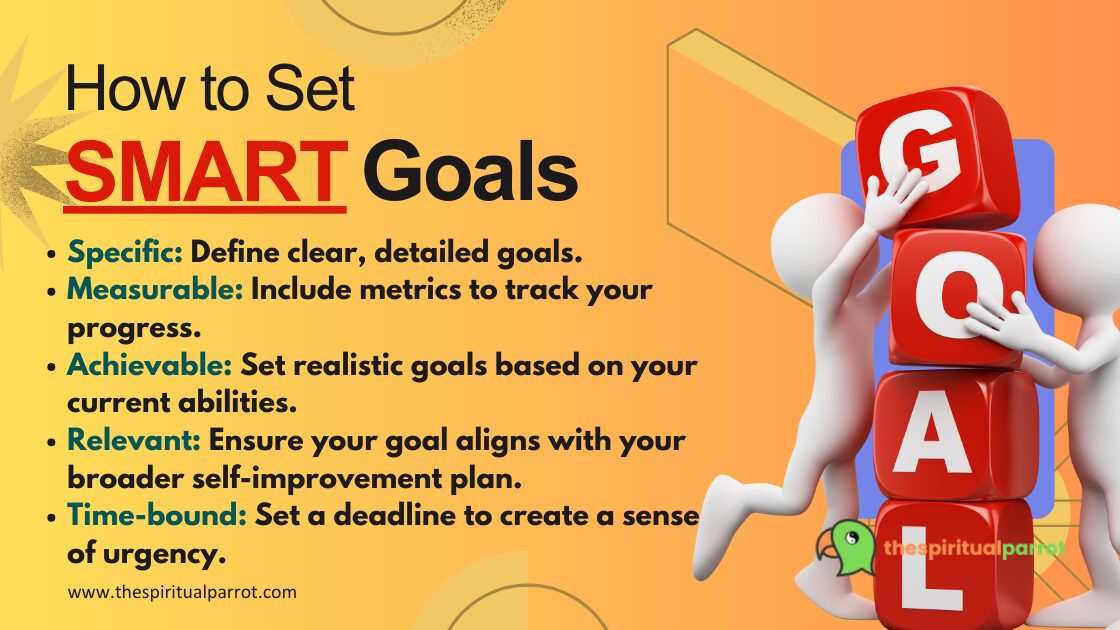
Why It’s a Problem
Setting unattainable goals can be incredibly discouraging. When we aim too high, we often forget to consider the smaller steps it takes to get there. Imagine committing to reading 50 books in a year without ever having been a consistent reader. The sheer weight of that goal can overwhelm you before you even start, and missing the mark early on makes it easy to abandon the effort altogether. Unrealistic goals create a cycle of frustration—when you don’t hit them, you start doubting your ability, which leads to loss of motivation.
In many cases, people confuse ambition with productivity. While big dreams are essential, they can backfire if they aren’t grounded in reality. The excitement of setting a lofty goal quickly fades when the pressure becomes too much. Instead of boosting confidence, these types of goals often diminish it, leaving us feeling defeated rather than empowered.
How to Fix It
The solution lies in setting SMART goals—goals that are Specific, Measurable, Achievable, Relevant, and Time-bound. This method ensures that your goals are clear, actionable, and realistic, increasing your chances of success. Here’s how you can apply the SMART framework to your own goal-setting:
- Specific: Be clear and detailed. Instead of a vague goal like “I want to be healthier,” make it specific: “I want to walk for 30 minutes every day.”
- Measurable: Make sure you can track your progress. If your goal is to save money, quantify it. “I will save $100 every month.”
- Achievable: Ensure your goal is realistic for your current situation. Don’t set a target that’s out of reach given your time, skills, or resources.
- Relevant: Your goal should align with your larger self-improvement vision. Ask yourself if this goal is truly important to you and your overall well-being.
- Time-bound: Set a deadline to create a sense of urgency. Rather than saying, “I’ll learn a new skill,” try, “I’ll complete an online course in the next 3 months.”
For example, if you’re working on fitness, rather than saying, “I’ll lose 30 pounds in a month,” shift to “I’ll lose 5 pounds in the next month by exercising 3 times a week and cutting back on processed foods.” By breaking your larger ambitions into smaller, manageable pieces, you’ll build confidence and avoid the burnout that comes with setting goals that are too big, too soon.
Mistake #2: Lack of Consistency
Self-improvement isn’t a one-time effort; it requires ongoing commitment. Many people start strong, fueled by motivation, but struggle to maintain their efforts over time. Consistency is key when it comes to creating lasting change, yet this is where many stumble. Without consistent action, even the best intentions can fall flat, leaving progress stagnant or nonexistent. The need for regular, steady effort can’t be overstated—small, consistent steps over time yield far better results than short bursts of intense activity.
Why It’s a Problem
Inconsistent efforts sabotage self-improvement. Whether it’s exercising sporadically, journaling once in a while, or practicing mindfulness only when it’s convenient, lack of consistency leads to missed opportunities for growth. This inconsistency prevents habits from taking root and leaves you starting over again and again.
For example, someone who tries to meditate every day but skips it often may find it hard to experience the benefits of mindfulness. Habits, routines, and personal development goals need time and repetition to produce results. When you’re inconsistent, you disrupt the momentum and often end up frustrated by the lack of visible progress. Without the discipline to stick with something regularly, it’s easy to lose sight of your goals altogether.
How to Fix It
Building consistency starts with manageable, realistic actions. It’s more effective to commit to a small, sustainable habit than to aim for an intense but unsustainable regimen. Here are a few strategies to help you stay consistent:
- Start Small: Focus on one small, simple habit at a time. If you want to write every day, begin with just 5-10 minutes rather than forcing yourself into an hour-long session. Over time, as this habit becomes second nature, you can expand it.
- Set a Routine: Create a daily or weekly routine that works with your life. Whether it’s exercising in the morning, meditating before bed, or setting aside time for learning on weekends, consistency thrives when it’s part of a regular schedule.
- Track Your Progress: Keeping track of your efforts helps maintain accountability. Use a journal, app, or calendar to mark off each day you complete your habit. It’s satisfying to see the streak build up, and it encourages you to keep going.
- Forgive Slip-ups: If you miss a day or stumble along the way, don’t abandon your efforts. One missed day doesn’t mean you’ve failed. Instead, focus on bouncing back quickly and continuing where you left off.
For instance, if you’ve set a goal to read more books but find it hard to stick to, try dedicating just 15 minutes a day. Over time, this small but consistent effort will add up, and you’ll find yourself completing books more frequently without feeling overwhelmed.
Mistake #3: Ignoring Mental Health
While physical fitness and skill-building often get the spotlight in self-improvement, mental health can sometimes take a back seat. People tend to focus on external changes while neglecting their emotional and psychological well-being. However, mental health is foundational to any kind of personal growth. Without it, progress in other areas can feel hollow or unsustainable. Prioritizing your mental health isn’t just an option—it’s essential for maintaining balance and long-term success.
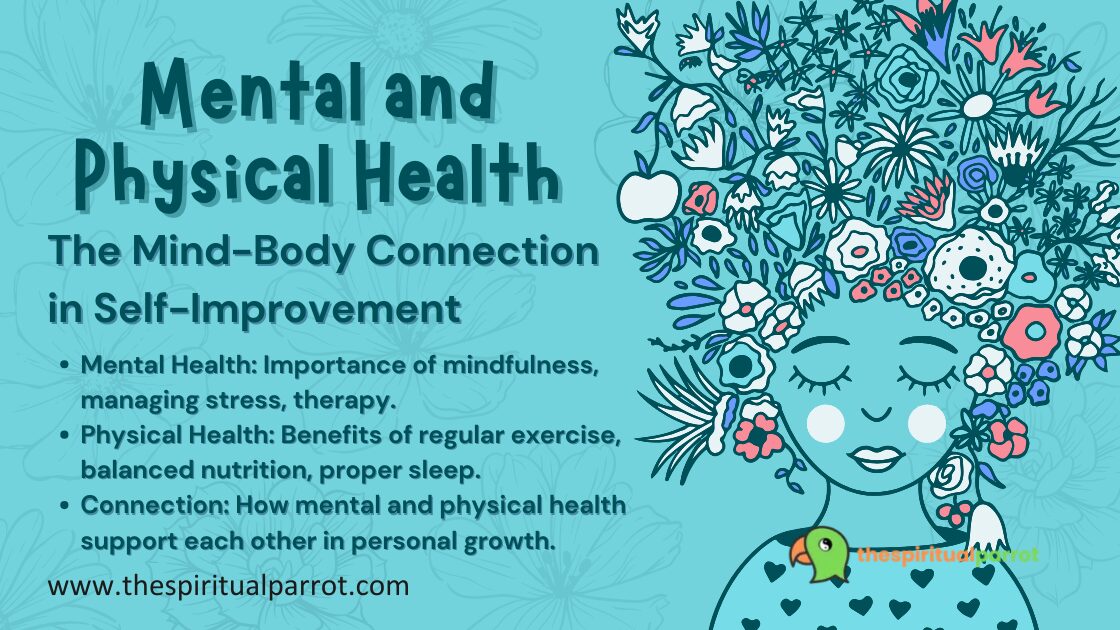
Why It’s a Problem
Ignoring mental health issues while pursuing self-improvement can lead to burnout, anxiety, and a sense of failure. When you’re mentally exhausted, it becomes nearly impossible to focus on your goals or stay motivated. Many people fall into the trap of thinking that improving their physical health, career, or relationships will automatically lead to happiness, but if mental health is neglected, these achievements can feel unfulfilling.
For example, you might push yourself hard at work, trying to climb the career ladder while ignoring stress, anxiety, or exhaustion. This might result in a promotion or more responsibilities, but without addressing the underlying mental strain, you could quickly find yourself overwhelmed and unable to enjoy the fruits of your labor. Mental health is the anchor that keeps everything else grounded.
How to Fix It
Incorporating mental health practices into your daily routine is crucial for sustained growth. Here are some ways to make sure your mental well-being stays a priority:
- Practice Mindfulness or Meditation: Daily mindfulness practices, such as meditation or deep breathing exercises, help reduce stress and improve focus. Just 10-15 minutes a day can make a big difference in how you handle challenges.
- Seek Therapy or Counseling: Don’t hesitate to talk to a professional when you feel overwhelmed. Therapy can provide a safe space to explore your feelings and find solutions to emotional roadblocks.
- Journaling: Writing down your thoughts and feelings is a great way to process emotions and reflect on your progress. It helps to clear mental clutter and provides insights into patterns that may affect your mental health.
- Maintain Work-Life Balance: Make sure to carve out time for rest and relaxation. All work and no downtime is a recipe for burnout. Prioritize activities that recharge you, whether it’s spending time with loved ones, engaging in hobbies, or simply taking a break.
For example, if you’re working on a fitness goal, you might add in a daily meditation session or spend time journaling after your workouts to reflect on your mental and emotional state. These small actions can go a long way in keeping your mental health in check, ensuring you don’t just improve outwardly but internally as well.
Mistake #4: Comparing Yourself to Others
In today’s world, it’s easier than ever to fall into the comparison trap. With social media constantly showcasing other people’s highlights, it’s tempting to measure your progress against someone else’s. However, personal growth is exactly that—personal. Everyone’s journey is unique, and comparing yourself to others often leads to unnecessary frustration and self-doubt. The truth is, comparing yourself to others can detract from your own progress and cause you to lose focus on what really matters—your own path.
Why It’s a Problem
Comparing yourself to others can be a major roadblock to self-improvement. It often leads to feelings of inadequacy, even when you’re making real progress. For instance, imagine you’ve just started a fitness routine and you see someone else who’s already reached the level of fitness you’re aspiring to. Instead of feeling motivated, you might feel like your own efforts aren’t enough.
This constant comparison creates unrealistic expectations. You begin to measure your progress against someone who might be years ahead of you or on a completely different path. This can cause unnecessary stress and even cause you to give up altogether, believing you’ll never reach the same level. The truth is, comparison overlooks the fact that everyone’s journey is different, and we all start from different places.
How to Fix It
The key to overcoming the habit of comparing yourself to others is to focus on your unique journey and progress. Here are a few strategies to help shift your mindset:
- Celebrate Small Wins: Track your own progress and celebrate every small victory. Whether it’s running a bit farther, sticking to a new habit, or simply feeling better overall, recognize the growth you’re experiencing.
- Limit Social Media Exposure: If you find yourself constantly comparing your life to what you see online, it may be time to take a break from social media. These platforms often show a polished, unrealistic version of life that doesn’t reflect the whole picture.
- Shift Your Focus to Personal Growth: Focus on your goals and how far you’ve come. Instead of comparing yourself to someone else, compare your current self to where you were last week, last month, or last year. This helps you stay grounded in your own journey.
- Practice Gratitude: Take time to appreciate what you have achieved so far. Gratitude helps shift your mindset from lack to abundance, allowing you to focus on what you’ve already accomplished instead of what you haven’t yet.
For example, if you’re working on building a new skill and see someone else who seems way ahead, remind yourself that they’re at a different stage in their journey. Focus on what you have improved, and measure your success by your own standards, not someone else’s.
Mistake #5: Not Seeking Feedback
Self-improvement often feels like a solo journey, but it doesn’t have to be. One common mistake people make is thinking they can figure everything out on their own, without ever asking for guidance. Feedback, whether from friends, colleagues, or mentors, provides valuable insights that can highlight blind spots, offer new perspectives, and accelerate your growth. Ignoring feedback means missing out on opportunities for improvement, and sometimes even repeating mistakes that could have been easily corrected.
Why It’s a Problem
When you don’t seek feedback, you limit your own progress. It’s easy to get stuck in your own way of thinking or fall into patterns that aren’t productive. Without an outside perspective, you might overlook areas where you could improve or misinterpret your progress altogether.
For instance, imagine you’re working on a presentation for work or school, and you never show it to anyone for feedback. While you might think it’s perfect, someone else might notice unclear sections or confusing visuals that you hadn’t considered. By not seeking feedback, you miss out on the chance to refine your work and present the best possible version of yourself or your skills.
Feedback isn’t just about identifying flaws; it’s also about recognizing strengths you might not have noticed. This can be incredibly motivating and help you build on the things you’re already doing well.
How to Fix It
To fully embrace feedback and use it as a tool for self-improvement, you need to actively seek it out and be open to constructive criticism. Here’s how you can start:
- Ask for Specific Feedback: Instead of asking, “What do you think?” ask for feedback on specific areas. For example, “Do you think I communicated this idea clearly?” or “How could I improve this section?” This invites more detailed and actionable input.
- Embrace Constructive Criticism: Understand that feedback, even when critical, is meant to help you grow. It’s natural to feel defensive, but try to view criticism as an opportunity to learn and improve, rather than as a personal attack.
- Seek Feedback from Different Sources: Don’t limit yourself to just one perspective. Ask for input from people with different backgrounds and experiences. This can give you a more well-rounded view and help you see things from angles you hadn’t considered.
- Reflect on the Feedback: Once you’ve received feedback, take time to process it and decide how you can apply it moving forward. Not all feedback needs to be acted on immediately, but the insights you gain can guide your future decisions.
For example, if you’re working on improving your public speaking, ask for feedback after each presentation. Over time, the advice you receive—whether it’s about your body language, tone of voice, or how you structure your talks—will help you refine your skills and become more confident.
Mistake #6: Overloading with Too Many Changes at Once
When you’re excited about self-improvement, it’s easy to want to change everything at once—your habits, your routines, your goals. However, trying to tackle too many changes simultaneously can leave you feeling overwhelmed and unable to maintain any of them. Spreading your focus too thin often leads to burnout, where progress stalls or even regresses. While the desire to improve multiple areas of your life is natural, it’s important to approach change in a sustainable, manageable way.
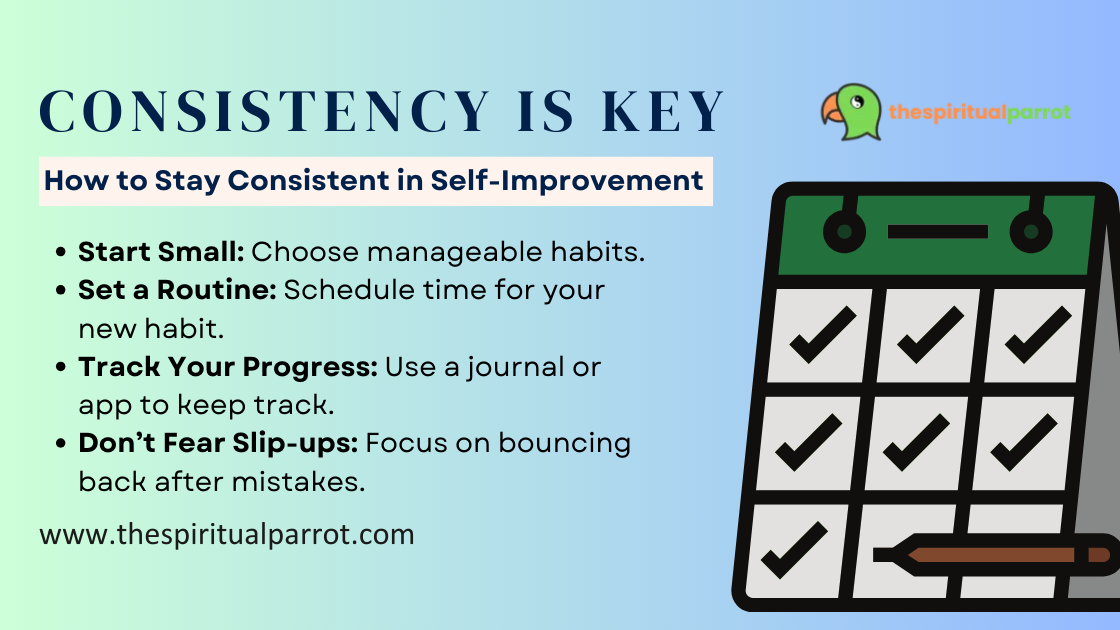
Why It’s a Problem
Making too many changes at once divides your energy and attention. Instead of making real progress in one area, you end up giving partial effort to multiple areas, which usually leads to frustration. For instance, if you decide to start a new fitness routine, overhaul your diet, take up meditation, and aim for a promotion at work all in the same month, it’s likely that you’ll struggle to keep up with any of them.
Juggling too many goals at once can also reduce your sense of accomplishment. When progress is slow across multiple fronts, it’s easy to feel like you’re not getting anywhere. This often leads to abandoning your goals altogether because the results don’t seem worth the effort. Remember, it’s not about how many things you can change at once, but how consistently you can stick to a few meaningful changes.
How to Fix It
The solution to this problem is focus—narrowing your attention to one or two key areas at a time, rather than trying to do everything at once. Here’s how to approach it:
- Prioritize Your Goals: Decide which areas of your life need the most immediate attention. Focus on the goals that will have the greatest impact or that you feel most ready to tackle. For example, if improving your physical health is a priority, start with small, achievable fitness goals before adding anything else.
- Break It Down: Once you’ve identified your focus, break it into smaller, manageable steps. For example, instead of changing your entire diet overnight, start by cutting out one unhealthy food or adding one healthy habit at a time.
- Focus on Habit Formation: Concentrate on creating lasting habits rather than making quick changes. It’s better to fully establish one or two habits that stick before moving on to the next. This builds a strong foundation for future changes.
- Give Yourself Time: Change takes time. Instead of expecting overnight results, give yourself space to grow in each area. Set realistic timelines, and don’t rush the process.
For example, if you’re looking to improve your fitness, start with committing to a simple routine like walking or going to the gym three times a week. Once you’ve built that habit, you can gradually add more intensity or new goals, such as focusing on strength training or flexibility.
Mistake #7: Lack of Patience
Self-improvement is a gradual process, but in a world where instant gratification is the norm, patience is often overlooked. Many people expect quick results from their efforts and become frustrated when progress doesn’t come fast enough. The truth is, meaningful change takes time, and without patience, it’s easy to give up before seeing the benefits of your hard work. Understanding that self-improvement is a journey, not a race, can make all the difference.
Why It’s a Problem
When you lack patience, you set yourself up for disappointment. Expecting immediate results can lead to frustration when changes aren’t as rapid or noticeable as you’d hoped. This impatience often causes people to abandon their goals prematurely, believing that their efforts are in vain. For instance, someone might start a new fitness regimen expecting to see visible results in a few weeks. When those results don’t appear quickly, they may lose motivation and stop exercising altogether.
Patience allows you to accept that progress is often slow and sometimes invisible at first. Without it, even small setbacks can feel monumental, and you risk losing sight of the long-term benefits of consistent effort.
How to Fix It
Cultivating patience is about shifting your mindset and learning to appreciate the process rather than rushing toward the outcome. Here are a few strategies to help develop patience:
- Set Realistic Expectations: Understand that progress in self-improvement takes time. Whether you’re learning a new skill, building a habit, or improving your health, set realistic timelines for yourself. Avoid expecting significant changes overnight.
- Celebrate Small Wins: Instead of focusing on the ultimate goal, take time to acknowledge the small steps you’re taking along the way. Whether it’s going to the gym consistently for a month or reading one more chapter of a book, these small victories help you stay motivated.
- Focus on the Journey: Try to enjoy the process of self-improvement rather than only focusing on the end result. For example, if you’re learning a new language, celebrate the joy of learning new words and phrases, rather than stressing about fluency.
- Practice Patience as a Skill: Recognize that patience is a skill you can improve over time. When you find yourself feeling impatient, take a moment to breathe, reflect on how far you’ve come, and remind yourself that every bit of progress counts.
For example, if you’re working on losing weight, understand that progress might be slow at first. Instead of obsessing over the number on the scale, focus on how your energy levels are improving or how your clothes are fitting better. These small indicators of progress will keep you motivated and patient as you work toward your larger goal.
Mistake #8: Neglecting Physical Health
When people focus on self-improvement, they often prioritize mental or emotional growth while overlooking the importance of physical health. However, your body plays a crucial role in how you perform and feel day-to-day. Neglecting physical health can lead to fatigue, poor productivity, and even mental strain. To truly thrive in all areas of self-improvement, you need to take care of your physical well-being.
Why It’s a Problem
Neglecting your physical health can have a ripple effect on other aspects of your life. When you’re not eating well, exercising regularly, or getting enough rest, your energy levels suffer. This makes it harder to stay focused, motivated, and engaged with your goals. For example, someone trying to improve their career skills might work long hours and neglect sleep or nutrition, which eventually leads to burnout or decreased performance.
Physical health also affects your emotional and mental state. Without proper care, it’s easy to feel sluggish, unmotivated, and even more prone to stress or anxiety. In the long run, neglecting physical health can limit your ability to maintain the consistency and energy needed for meaningful self-improvement.
How to Fix It
Taking care of your physical health doesn’t have to be complicated or time-consuming. Small, consistent actions can make a big difference in how you feel and perform. Here are a few ways to ensure that physical health becomes a priority in your self-improvement journey:
- Incorporate Exercise: Regular physical activity boosts energy, improves mood, and enhances mental clarity. It doesn’t have to be intense—start with a simple routine like walking for 30 minutes a day, doing yoga, or engaging in a sport you enjoy.
- Prioritize Nutrition: What you eat fuels your body and brain. Aim for a balanced diet rich in fruits, vegetables, whole grains, and lean proteins. This provides the nutrients your body needs to function at its best.
- Get Enough Rest: Sleep is often the first thing sacrificed in the pursuit of productivity, but it’s essential for recovery and overall health. Make sure you’re getting 7-9 hours of quality sleep each night to allow your body and mind to recharge.
- Listen to Your Body: Pay attention to how your body feels. If you’re constantly tired, sluggish, or stressed, it might be a sign that your physical health needs more attention. Address these signals early to avoid burnout.
For example, if you’re working on improving productivity at work, start by improving your sleep schedule and incorporating a quick morning workout. You’ll likely notice that you have more energy, focus, and mental clarity throughout the day, making it easier to achieve your goals.
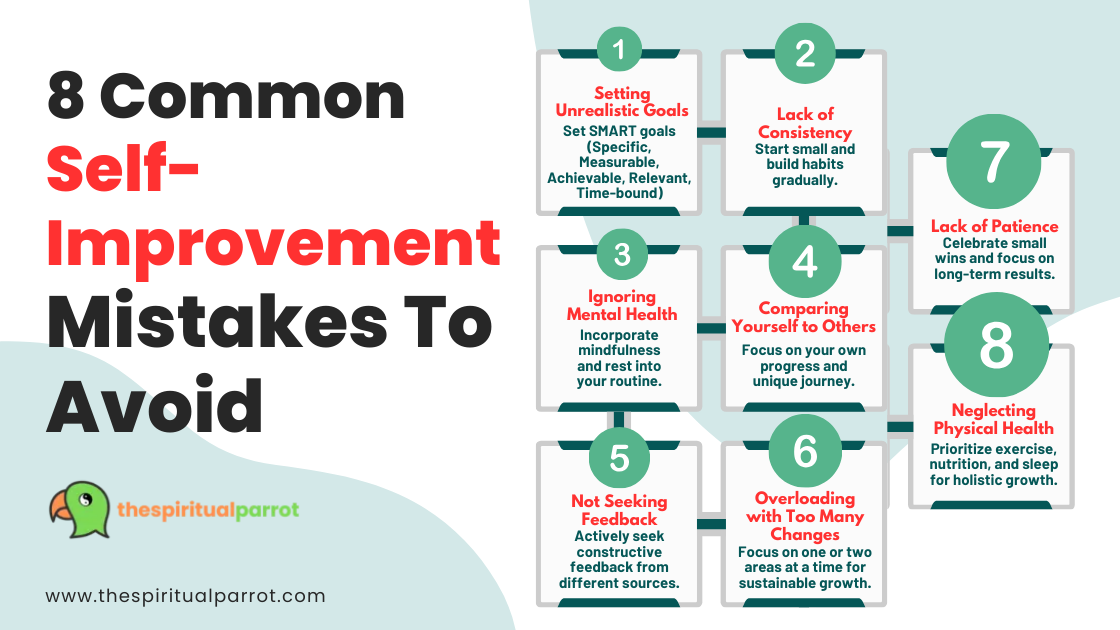
Avoiding Common Pitfalls for Lasting Growth
Self-improvement is a powerful journey, but it’s easy to fall into common traps that can derail your progress. Whether it’s setting unrealistic goals, struggling with consistency, or neglecting mental and physical health, these mistakes can hold you back. The good news is, by recognizing and addressing them, you can stay on course and make meaningful, lasting changes.
Remember, real growth happens when you approach self-improvement with patience, focus, and balance. Instead of rushing the process or comparing your progress to others, focus on your unique path. By avoiding these common pitfalls, you’ll find that the journey to becoming the best version of yourself is not only more achievable but also more enjoyable.
Keep moving forward, celebrate your small wins, and always prioritize both your mental and physical well-being. The results will follow, and they’ll be worth the effort.
